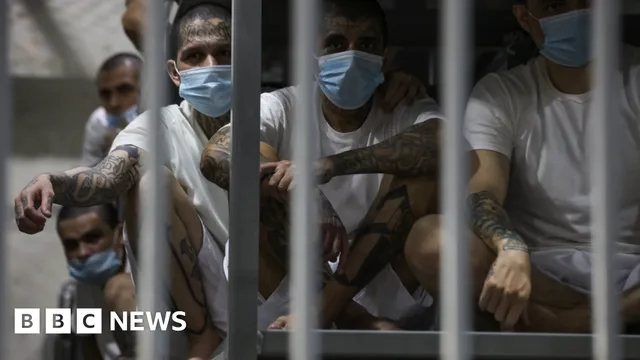
Nayib Bukele proposes prisoner swap with Venezuela for deported Venezuelans
2025-04-22 23:56- Nayib Bukele proposed a prisoner swap involving 252 Venezuelan deportees and 252 political prisoners from Venezuela.
- He directed his offer to Nicolás Maduro, noting many political prisoners are unjustly detained for opposing his regime.
- This proposal reflects ongoing scrutiny about El Salvador's treatment of deported individuals amidst complex immigration policies.
Express your sentiment!
Insights
In a recent social media post, Salvadoran President Nayib Bukele proposed a significant humanitarian agreement aimed at addressing the plight of Venezuelan migrants. This proposition involves a prisoner swap, where Bukele suggested repatriating 252 Venezuelans deported from the United States in exchange for an equal number of political prisoners held in Venezuela. Bukele's offer directly targets Venezuelan President Nicolás Maduro, highlighting that many of the deportees are incarcerated in El Salvador's notorious Terrorism Confinement Center (CECOT) due to accusations of gang affiliations. However, Bukele contended that the political prisoners are unjustly detained for opposing Maduro's regime, making the proposal a potential opportunity for a diplomatic resolution. The backdrop to this proposal is the ongoing scrutiny faced by Bukele's government regarding its treatment of many deported Venezuelans. The United States, under the Trump administration, sent a significant number of Venezuelan migrants to El Salvador, claiming many were associated with criminal activities, including the Tren de Aragua gang. Critics have raised concerns about the lack of substantial evidence for these claims, leading to broader discussions on human rights and political asylum. Various politicians, journalists, and activists have been identified by Bukele as political prisoners worthy of release, drawing attention to the personal connections many have to Venezuela's opposition movement. Bukele noted that many individuals on the Venezuelan side of the proposed swap, including family members of prominent opposition figures and journalists, have been detained without clear justification. In his communication, he criticized Maduro's electoral practices and the harsh measures taken against those who oppose his administration. As these negotiations unfold, Bukele has indicated that his foreign ministry will engage with the Maduro government, although there has yet to be an official response from Venezuelan authorities. The proposal emerges at a time when El Salvador grapples with the implications of its immigration policies and the detention conditions within its corrections system. El Salvador's archbishop has expressed concerns about the country becoming a large international prison due to the influx of migrants. While Bukele's approach may resonate with the current political climate, it remains unclear whether this proposal will foster dialogue or become a point of contention between the two nations, especially considering the contentious landscape of Venezuelan politics and the external pressures from international organizations regarding human rights practices.
Contexts
Nayib Bukele, the President of El Salvador, has recently proposed a controversial plan regarding prisoner swaps that has garnered both domestic and international attention. This proposal is part of his broader strategy to confront the pervasive violence and crime associated with gangs in the country. The idea behind the prisoner swap is to exchange inmates from El Salvador for those incarcerated abroad, potentially giving the Salvadoran government leverage to negotiate to reduce the number of gang members imprisoned in the country, thereby addressing what Bukele deems a public safety crisis. Advocates argue that this approach could help reduce overcrowding in prisons and provide opportunities for rehabilitation for offenders. However, the proposal has raised ethical concerns relating to human rights and the implications of dealing with criminal networks internationally. Critics argue that such swaps could normalize criminal activity and undermine judicial processes. One of the primary motivations behind Bukele's prison swap proposal is the escalating violence and crime rates attributed to gang activity in El Salvador. The violent reputation of certain gangs, mainly MS-13 and Barrio 18, has been a significant driver for the government to seek radical solutions. Despite the controversial nature of his policies—including state of emergency measures leading to mass arrests—Bukele maintains a substantial level of public support, citing a decrease in homicides and an improved sense of security in the country. This positive public perception aids in promoting the prisoner swap proposal as a necessary step for a more profound solution to gang violence, although skeptics question the long-term efficacy of such measures. The international community remains alert to the implications of Bukele's proposal. Many human rights organizations have expressed concern that the swap could violate international conventions against human trafficking and arbitrary detention. There is also trepidation over the potential for these deals to allow the Salvadoran government to extricate itself from accountability regarding its treatment of prisoners and human rights issues. The notion of negotiating with foreign entities to exchange inmates could also set a troubling precedent in global criminal justice. Furthermore, opponents of the proposal caution that it might exacerbate the existing tensions between the Salvadoran government and civil society, as the public grapples with the ethical dimensions of legitimizing and empowering criminal organizations through such negotiations. In summary, Nayib Bukele's proposal for a prisoner swap emerges at a time when El Salvador is dealing with rampant gang violence and public demand for innovative solutions. While the proposal aims to tackle practical concerns, such as prison overcrowding and enhancing safety, it evokes significant ethical debates and potential risks associated with legitimizing criminal activities. The implications of engaging in international prisoner swaps need to be critically evaluated, considering both the potential benefits of addressing crime effectively and the moral obligations of upholding human rights and justice. As the situation continues to unfold, it will be crucial to monitor both the domestic implications for Salvadoran society and the reactions from the global community regarding how such proposals are received and executed.